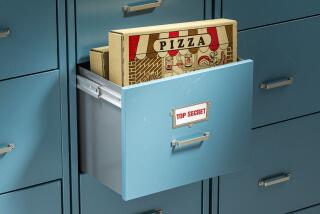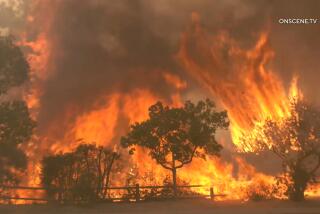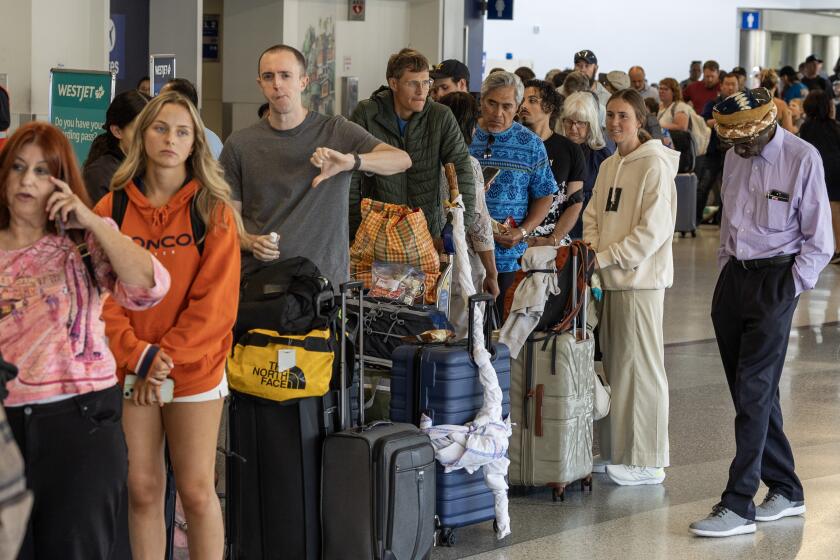Yom Kippur Evokes Mournful Memory of a Courageous Father
This afternoon is about memories.
Mostly bad ones.
They wash over us in waves of anguish, and we grip our seatmates’ hands to keep from being swept away.
We remember the dead this afternoon. And there is no sugarcoating.
In the Jewish faith, Yom Kippur is well known as a day for atonement. But in the coldness of a public place--perhaps a synagogue, but more likely a vast hotel ballroom rented to accommodate the holiday overflow--today is also a day for mourning. A day to warm ourselves by the light of our rabbis’ prayers, a lonely day despite the crowd, a cease-fire in the 364-day war against remembrance.
*
I am very close to my father on these afternoons, closer than I care to be the rest of the year.
Sometimes I am in his Sherman Oaks hospital room a week before he died. It is after midnight, and the hallway outside is dark except for the ghostly blue flickering of light from the TV screen in his room.
A tennis game is on--the replay of some match played in bright sunshine in a desert town--and the heat of the scene mocks the coolness of the room.
My father loved tennis, and as I kneel at his side and hold his warm hand, I try to talk with him about the players. I try to tell him about my day at work, about my commute, about my wife, about the day’s march of news from South America, an airline merger, the Dodgers game.
Of course, there is no response. Hasn’t been all day, I’m told by his nurse. His eyes are open but he cannot speak.
I put my head on his heaving chest and weep.
*
I know that my father wouldn’t be so sentimental. But I am not as strong as he.
His own father died when he was 13 during an Independence Day weekend in Great Falls, Mont. According to family lore, the following month Dad packed up his mom and three sisters in a long, black truck and drove them clear to Los Angeles.
I don’t know how my dad felt about those events. He seldom talked about his youth on the prairie. And he never talked about his father, an immigrant Russian fur trader and junk dealer.
I’m sure I would have asked him if I had had more time.
But there is no more time.
Only memories on Yom Kippur.
Sometimes on this day I find myself sitting next to him on a couch in his Tarzana home the day he returned from cancer treatment in Houston.
A year and a half before, we were shocked to learn that a sheet of cancer had shot undetected from his kidneys to his legs. A final burst of growth against his femoral artery would have killed him within days, we were told.
He spent a month at UCLA Medical Center recovering from surgery and was pronounced a lucky man--a victor in the “fight” against cancer.
By winter he was skiing in the Canadian Rockies, a drug-delivery syringe plugged into his chest the only clue that he’d been sick. By summer he was, as usual, beating me at tennis.
Despite his vigor, we knew something had gone wrong. He doubled over in pain after our matches. His legs barely lasted a set. When not gritting his teeth and swinging a racket, he couldn’t walk far without a helping shoulder to lean on.
We were learning the fallacy of the word fight when it comes to cancer.
He soon ditched his doctors at UCLA in search of better treatment at the University of Texas Medical Center. An oncologist there planned to put my father on a promising new drug protocol, and he moved with my courageous mother and his typically horizonless optimism into a nearby hotel.
And so on Yom Kippur, I always see his face the first day that he returned home after three months at his miracle center in Houston.
His voice was a whisper. His lips were blistered. He could scarcely gulp water without wincing. His normally tan, smooth, handsome skin had a dull yellow cast. His graceful brown eyes bulged out of his taut skull.
He gripped me hard around the shoulders, and in this great man’s bony grasp I felt real terror.
By then I thought I had toughened to the idea of cancer and the ebb and flow of battle. But I learned that I was wrong.
This was not a fight, it was a weary retreat.
*
My younger sister usually sits beside me during these Yiskor services as the rabbi prods our memories with moving poems from the liturgy and his own manila folders, and I never ask her what she’s thinking. I only feel her cold hand in mine, and I hear her sobbing.
Our father suffered beyond measure in his final weeks as we watched, useless. Even as he described the disease to us as sharp knives thrusting through his skin toward daylight--and even as he said he felt his bones bursting from the pressure of cancerous growth--we could not bring ourselves to slyly crank up the dial on his precious morphine and offer him the sweet elixir of a fatal dose.
For even in pain, even at his worst, we felt he was better off alive with us than dead.
Other days of the year, I see my father in full flush of his proud life--a generous man, ingenious and brave without limit. He knew a million jokes and had 2 million friends. He had a human understanding so rich that you felt he could look into your eyes and read your soul.
On Yom Kippur, I see him only in his suffering, and for once let myself look back into his baleful eyes.
It is a day of memories.
Mostly bad ones.
It is a day of atonement.
More to Read
Sign up for Essential California
The most important California stories and recommendations in your inbox every morning.
You may occasionally receive promotional content from the Los Angeles Times.






